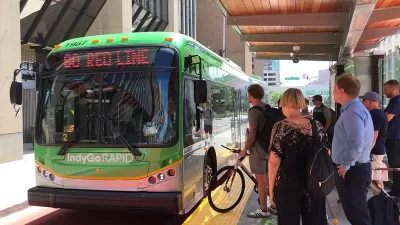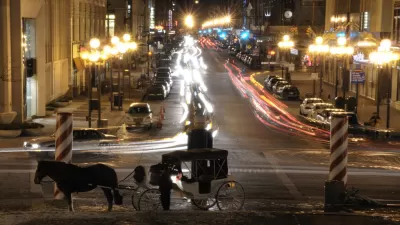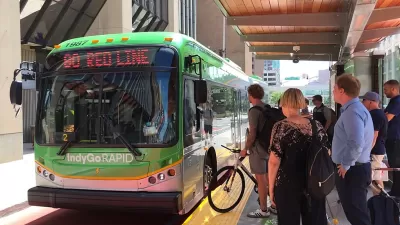IndyGo transit officials are required to match transit income tax revenue with funding from private sources, but haven't yet met that end of the bargain. A new state law would hold IndyGo accountable to those requirements.

"The Indiana Senate voted Thursday [February 27] to put teeth in a 2014 state law that required IndyGo to raise private dollars to help finance its mass transit operations, including the Red Line—something it has not done to date," reports Lesley Weidenbener.
"IndyGo officials say the legislation—which still requires final votes in the House and Senate—could significantly jeopardize its operations and its ability to build the planned Blue and Purple rapid transit lines," according to Weidenbener.
A 2014 law that, according to Weidenbener, "authorized a 0.25-percentage-point increase in the city’s income tax rate to fund IndyGo operations and new services," is the source of the controversy. That law required IndyGo to provide a 10 percent match of tax revenue with funding from private sources.
"The tax went into effect in October 2017 and is generating about $60 million per year. [State Senator Aaron] Freeman said that means IndyGo would need to raise about $6 million per year to meet the law’s threshold, but the agency has so far not raised any private money," according to Weidenbener. The 2014 law didn't include penalties if the city failed to meet that requirement, so the law proposed by Freeman last week would "require the state to withhold 10% of IndyGo’s local income tax revenue in years that it failed to meet the private funding threshold," according to Weidenbener.
Planetizen documented some of the long process of the city's adoption of the transit income tax, from approval by voters, to implementation delays and eventual approval by the City Council, to initial ridership success and ambitious plans enabled by the new revenue stream.
FULL STORY: Bill could strip IndyGo of millions of dollars, halt future work on Purple, Blue lines

Maui's Vacation Rental Debate Turns Ugly
Verbal attacks, misinformation campaigns and fistfights plague a high-stakes debate to convert thousands of vacation rentals into long-term housing.

Planetizen Federal Action Tracker
A weekly monitor of how Trump’s orders and actions are impacting planners and planning in America.

Chicago’s Ghost Rails
Just beneath the surface of the modern city lie the remnants of its expansive early 20th-century streetcar system.

Bend, Oregon Zoning Reforms Prioritize Small-Scale Housing
The city altered its zoning code to allow multi-family housing and eliminated parking mandates citywide.

Amtrak Cutting Jobs, Funding to High-Speed Rail
The agency plans to cut 10 percent of its workforce and has confirmed it will not fund new high-speed rail projects.

LA Denies Basic Services to Unhoused Residents
The city has repeatedly failed to respond to requests for trash pickup at encampment sites, and eliminated a program that provided mobile showers and toilets.
Urban Design for Planners 1: Software Tools
This six-course series explores essential urban design concepts using open source software and equips planners with the tools they need to participate fully in the urban design process.
Planning for Universal Design
Learn the tools for implementing Universal Design in planning regulations.
planning NEXT
Appalachian Highlands Housing Partners
Mpact (founded as Rail~Volution)
City of Camden Redevelopment Agency
City of Astoria
City of Portland
City of Laramie





























